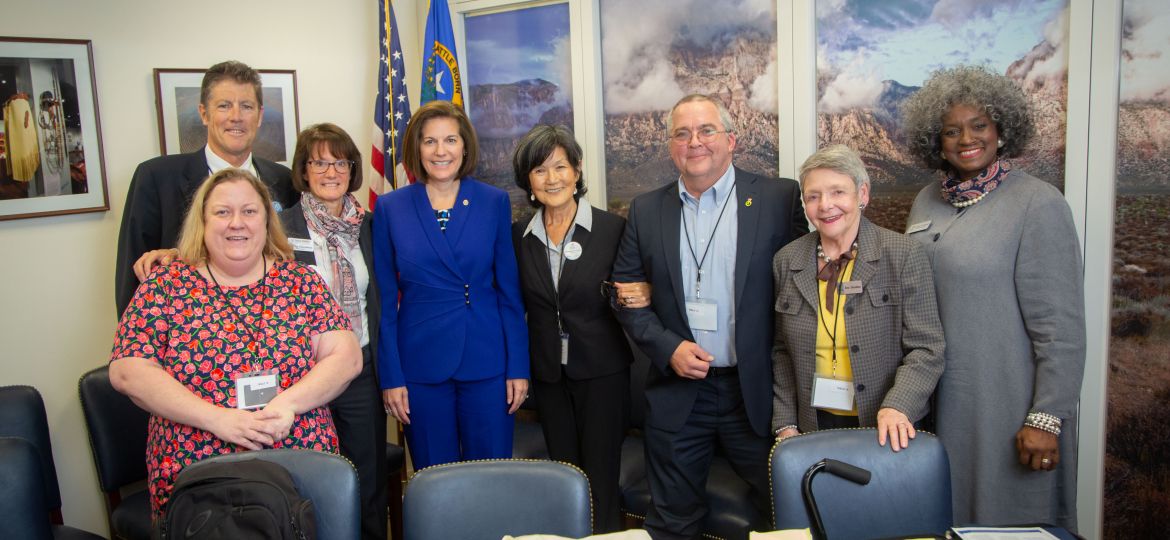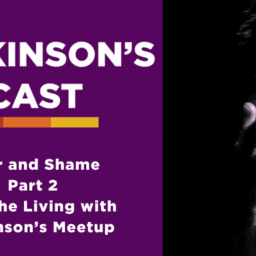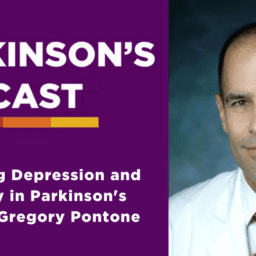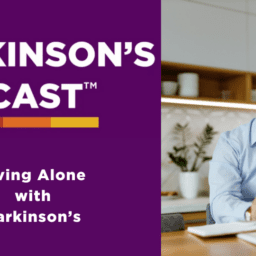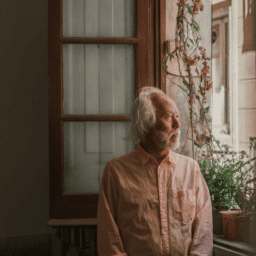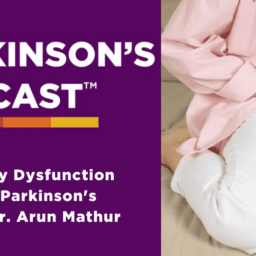The Parkinson’s Policy Forum is an annual educational and advocacy event in Washington, DC for people with Parkinson’s and care advocates. The 2019 forum, held September 9-10, brought together over 150 people from 38 states to participate in a day of education and training followed by a day of visiting 196 Congressional offices.
Sara Linn, Ambassador Leadership Program Manager for the Davis Phinney Foundation, was joined by 13 Foundation Ambassadors and advocates from 11 other Parkinson’s organizations in DC to bring these issues to the attention of members of Congress.
Here were the big issues on the table:
Parkinson’s Costs Double What We Thought
A new study published by The Michael J Fox Foundation, The Economic Burden of Parkinson’s Disease, reports a total cost of $52 billion per year from Parkinson’s. Just over half of this cost is the combination of direct medical costs like medication and non-direct costs like family caregiver time or forced early retirement. The US Federal government is then accountable for $25 billion in spending primarily through Medicare at $23 billion and the remainder supported by Social Security.
Capping Out-Of-Pocket Drug Costs
Medicare Part D is the outpatient retail medication plan that generally covers Carbidopa/Levodopa and numerous other Parkinson’s drug treatments. While Part D is vital coverage, the overall cost of prescription drugs is high, and there are coverage gaps which can lead to unpredictable increases in cost.
Increased Access to Mental Health Care
Expanding Medicare to increase access to mental health care is critical for people living with Parkinson’s. The Mental Health Access Improvement Act of 2019 (HR 945) would allow an additional 120,000 mental health providers to be included in the Medicare coverage program. A direct result of the Forum’s lobby day saw 10 new US Representative co-sponsors added to HR 954 and two additional Senators added to the companion bill, S286.
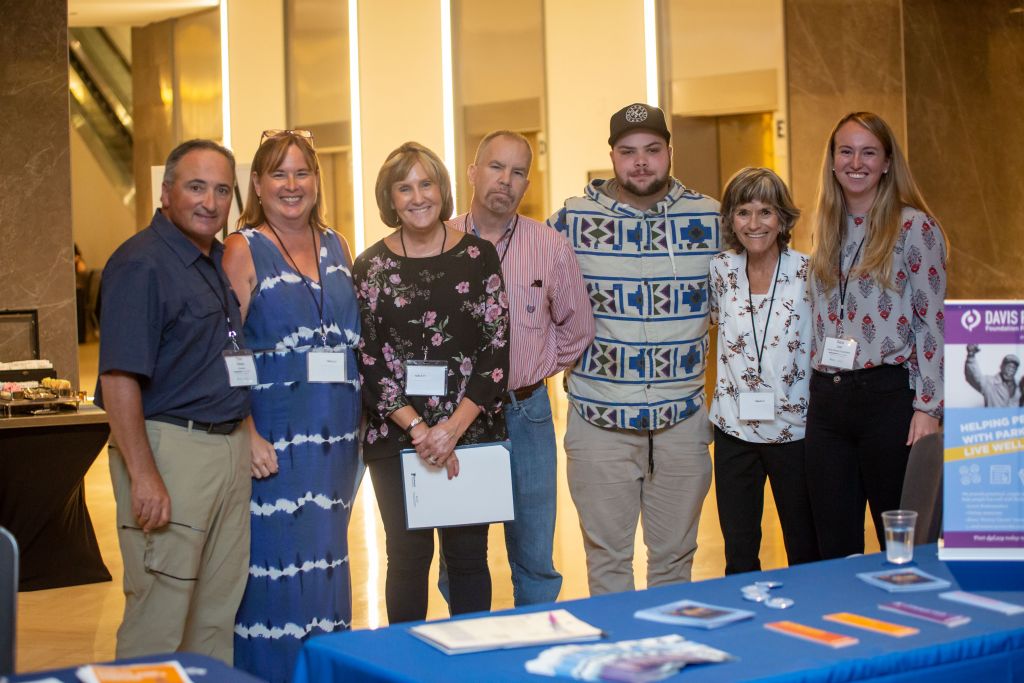
When our Ambassador Leadership Program Manager, Sara Linn, returned from the forum, we asked her about it.
Reports from Congressional offices say that thousands of advocates called in from all over the country while the Policy Forum delegation held meetings in offices. What was the feeling as you went from meeting to meeting?
With it being the first day back from Congressional recess, the energy was hectic, but it felt very empowering to be a part of it all. What should have tired us out seemed to have the opposite effect. Looking around the table that evening, you could see the excitement and pride in our smiles. Conversations were boisterous and plentiful, and we all felt we had done something important for the Parkinson’s community.
A key topic of the 2019 Forum is the economic burden of Parkinson’s healthcare costs on the US Federal Government. What can you tell us about the new data presented to legislators?
The data is startling. By talking one-on-one with the participants at the Forum, it was easy to see that many are heavily affected by the financial burden Parkinson’s has taken on their families. With no spending cap on out-of-pocket expenses for Medicare Part D, many families are unable to plan their finances and are left to choose between medications for different symptoms simply because they cannot afford to buy both.
Medicare insures 90% of people with Parkinson’s. Only 7% of people are covered through private insurance! In 2017, Parkinson’s accounted for $25 billion in total direct medical costs, and an additional $26.5 billion in indirect, non-medical, and unpaid care costs. While Parkinson’s is costing the nation $52 billion each year, only approximately $180 million is going to research. That’s why we’re asking Congress to prioritize increased research spending for Parkinson’s and to enact programs that offer improved care at lower costs.
Just like healthcare research, legislation takes a long time to pass; so, what can people do to bring attention to this subject in between these annual meetings? How can someone reading this help right now?
It’s all about getting in touch with your local governments. It’s one thing to advocate at the national level, but it can be even more impactful if you back it up by building strong relationships with your local representatives. Anyone can do this! You don’t have to be politically savvy to talk to your elected officials. They ultimately care about those in their communities and serving those needs. So, call or make an appointment and share your story today. And in the future. This problem is not going away any time soon.
In order to get even more insider scoop, we also spoke with several of our Davis Phinney Foundation Ambassadors who attended. Here’s what they had to say.
What was it like to visit your elected representatives on Capitol Hill?
This was my first time participating in the Parkinson’s Policy Forum; I had never really given much thought to the decisionmakers in our local and federal governments. Now that I know of three specific “Asks”, I realize that many of these legislators’ decisions directly affect the quality of my life, and I can speak to those needs with them.
I was also frequently struck by the youthfulness of Congressional staff and interns that we met with. I wondered whether they could relate to the challenges we are facing with Parkinson’. At the same time, their age made it feel even more urgent that we share our stories.
Patti Burnett – Davis Phinney Foundation Ambassador -Dillon, CO
At first, I felt a little uncomfortable figuring that they had other important business, but I quickly understood that Congressional representatives work for us and we need to make our concerns known. We need to speak up and advocate for ourselves and for the community, that’s how they determine what is important business.
Joe O’Connor – Davis Phinney Foundation Ambassador - Sterling, MA
Former Pennsylvania Governor Ed Rendell, who is currently living with Parkinson's, opened the Forum by delivering a keynote speech. What stood out for you from his speech?
That he is living well and taking charge of his care through exercise. When he quoted from Nan Littles's book “If I Can Climb Mt. Kilimanjaro, Why Can’t I Brush My Teeth,” I knew he needed a copy of the Every Victory Counts manual. It was an honor to introduce myself and present a copy to him. (Thank you for handing over your only copy, Sara!).
Pat Donahoo – Davis Phinney Foundation Ambassador – Las Vegas, NV
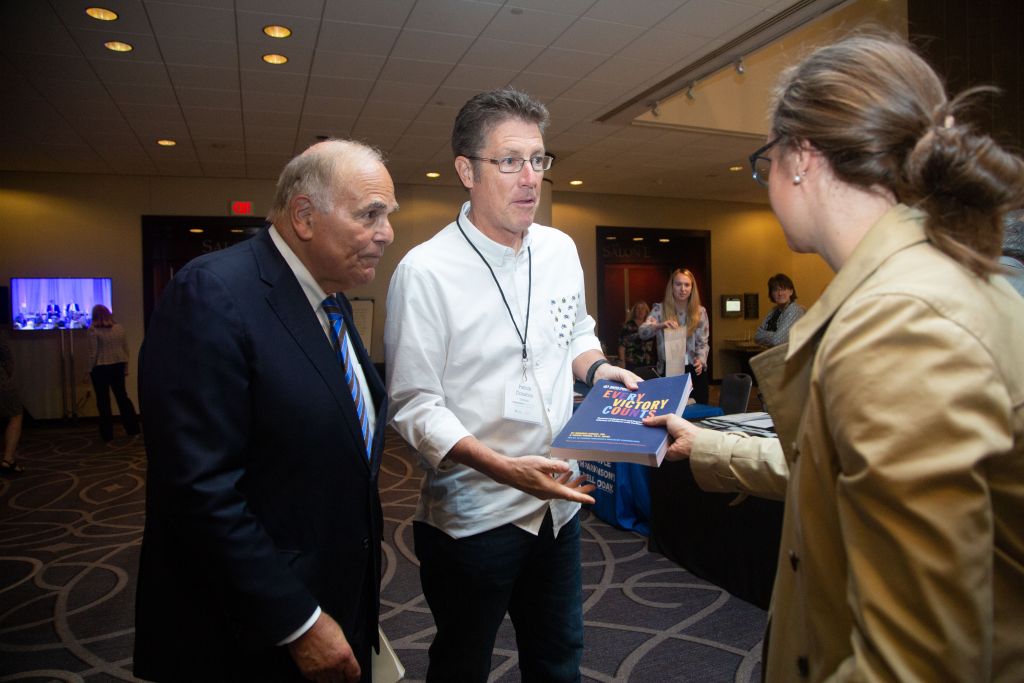
The greatest part of the speech by Governor Rendell was to hear him speak of the need to be as active as possible to help slow down the progression of Parkinson's. He noted others who wrote to him telling him how it works and he noted the effectiveness of a more active lifestyle.
Brian Reedy – Davis Phinney Foundation Ambassador – Carson City, NV
I was glad that he mentioned not to get political. There are presumptions that certain political party legislators will always vote certain way, but Parkinson’s is a personal story, not a political one.
Patti Burnett – Davis Phinney Foundation Ambassador -Dillon, CO
How will capping out-of-pocket spending for Medicare Part D help people with Parkinson’s live better?
For People with Parkinson's, capping out-of-pocket spending for Medicare Part D will stop the feeling of falling deeper and deeper into a financial hole. A cap would take the unknown out of the cost of prescription drugs and remove the stress and worry of a limitless debt.
Lily Reedy – Davis Phinney Foundation Ambassador - Carson City, NV
We all know that prescription drugs can be expensive. We also know that new drugs and therapies that arise from recent research are costly. A cap on out-of-pocket spending will allow people with Parkinson’s not only to plan home budgets but also to benefit from excellent therapies that could vastly improve the quality of their lives. Imagine learning about a new treatment and not having to first ask, "How much does it cost?"
Marty Acevedo – Davis Phinney Foundation Ambassador – Oceanside, CA
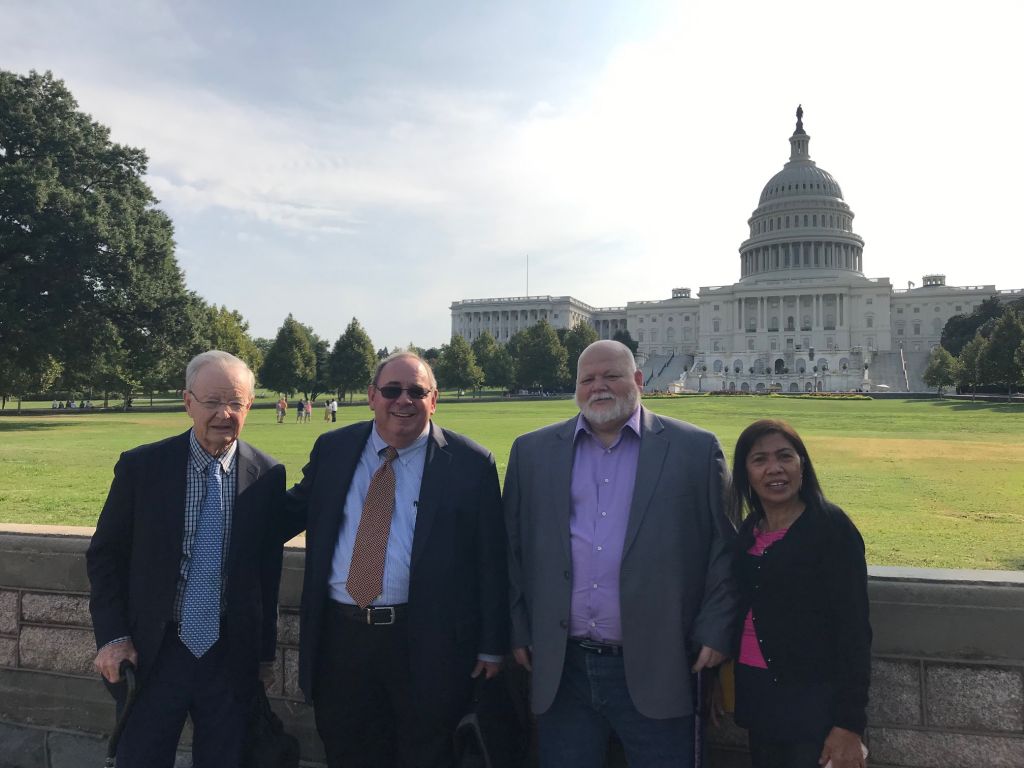
What did you learn about federal spending on healthcare and how can citizens take action to improve overall healthcare and research for Parkinson’s?
The federal government spends much more on healthcare than it does on research. If more money went to research, a cure may be found faster and save money overall.
Carol Clupny - Davis Phinney Foundation Ambassador – Hermiston, OR
Twenty-five billion dollars is spent each year for care for people with Parkinson’s through Medicare, Social Security and long-term care. That does not include lost wages for those of us who were forced to retire early, along with loss of productivity from family and care partners. I encourage citizens to lobby their legislators to increase funding for the National Institutes of Health for Parkinson's research. If a cure, or even just better management of Parkinson's is found, the cost to care for people with Parkinson’s would substantially diminish.
Marty Acevedo – Davis Phinney Foundation Ambassador – Oceanside, CA
What stands out for you from your trip to the Parkinson’s Policy Forum?
The Nevada delegation, like so many other state groups, believes, “No person with Parkinson’s gets left behind.” Georgia advocate John Humphreys injured himself while in DC and was unable to make the rounds on Capitol Hill; so, our group took an Uber over to George Washington University Hospital to visit and offer encouragement before we began our day of meetings. Not only did this bring a smile to John, but it also gave us more talking points to share regarding this crazy disease and health care. It was exciting to travel across the city to get back to our meetings with John in our thoughts.
Pat Donahoo – Davis Phinney Foundation Ambassador – Las Vegas, NV
Rep. Greg Walden’s office changed our meeting time from noon to 5:00pm so that he could personally meet with us. He had read about Charlie and me in the paper and asked about bicycling. He had me sit in his office chair and gave me a gavel to hold for a photo. This was my first time lobbying on Capitol Hill and I did not know what to expect. I was pleasantly surprised at the welcome we had in each office.
Carol Clupny - Davis Phinney Foundation Ambassador – Hermiston, OR
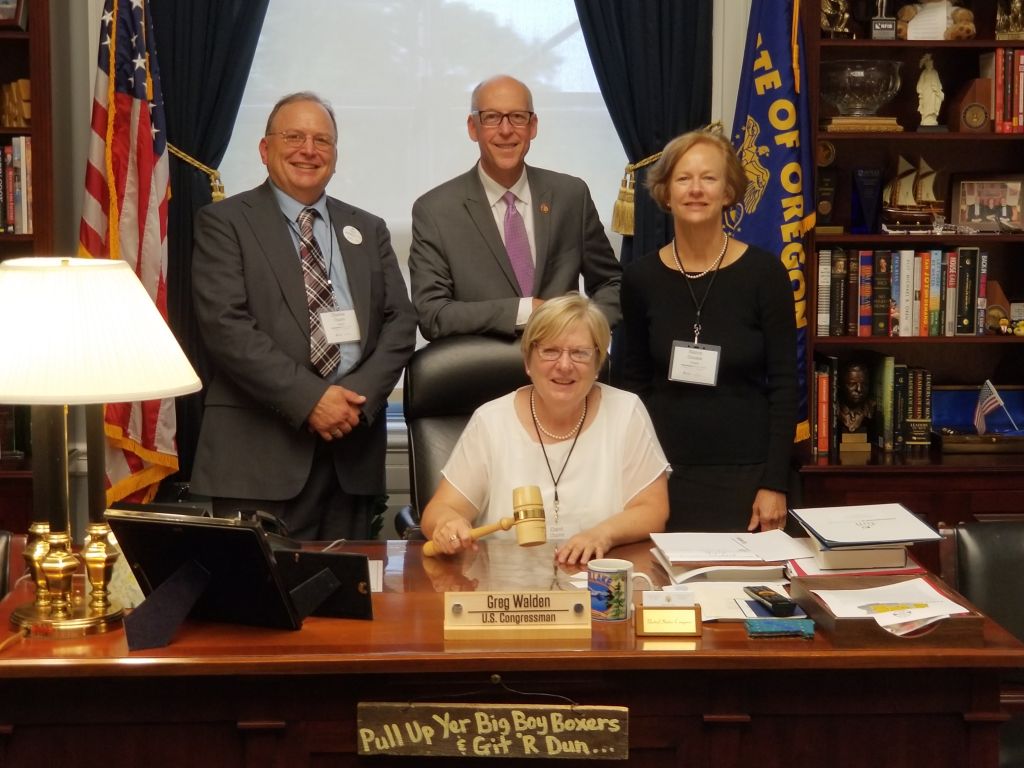
Another delegate from Florida and I met with staff from our two state Senators and one Congresswoman after we returned home. Those were productive meetings, probably affording us more time than we would have been given in DC.
John Alexander - Davis Phinney Foundation Ambassador - Orlando, FL
Traveling with a cute service dog is a great ice breaker.
Lily Reedy – Davis Phinney Foundation Ambassador – Carson City, NV
Many people we talk to are curious about the Policy Forum, but feel they don’t have the expertise to attend. Or they are intimidated by the process. As Patti, Marty, Brian, Carol, Joe, Pat and Sara have demonstrated, this is an important way to be heard and to advocate for yourself and others. If you’re interested but nervous about attending any Parkinson’s advocacy events, please feel free to reach out to any of those Ambassadors. They’d love to help.
Or, maybe you'd like to become a Davis Phinney Foundation Ambassador yourself? Learn more and apply here.
Take Action
You don’t need to attend the Parkinson’s Policy Forum to make your voice heard, and you don’t even have to visit Washington, DC. Each of the three priorities presented at the Forum is listed below with links that will tell you where to send an email to your Congressional representatives asking for their support.
- Protect Financial Access to Medications through Medicare Part D
- Expand Access to Mental Health Care for People with Parkinson’s
- Investing in Research Toward a Cure Helps Alleviate the Financial Burden on Government Programs
How to Contact Your Elected Officials - This guide has links to connect you to all of your federal, state and local elected leaders.
Pictured in title photo: Pat Donahoo (back left), Senator Catherine Cortez Masto D-NV (blue jacket), Lily Reedy & Brian Reedy, (center) Credit: Joe Shymanski - 2019 Parkinson's Policy Forum


